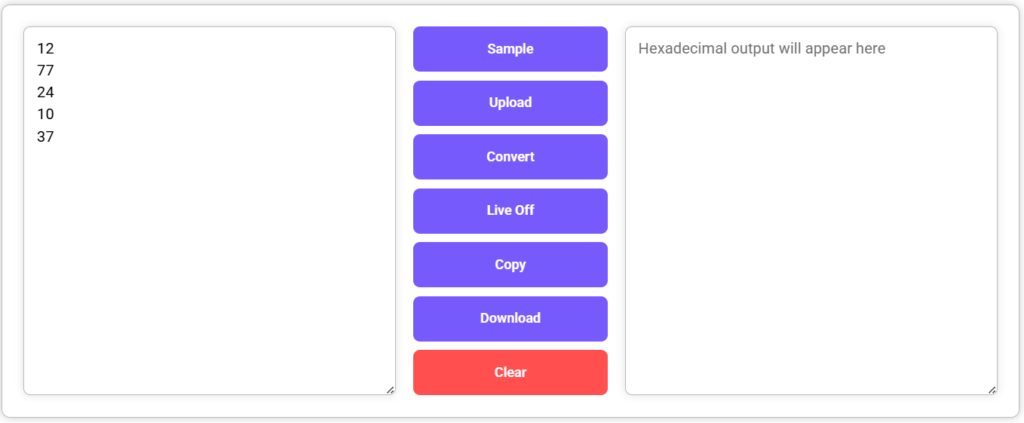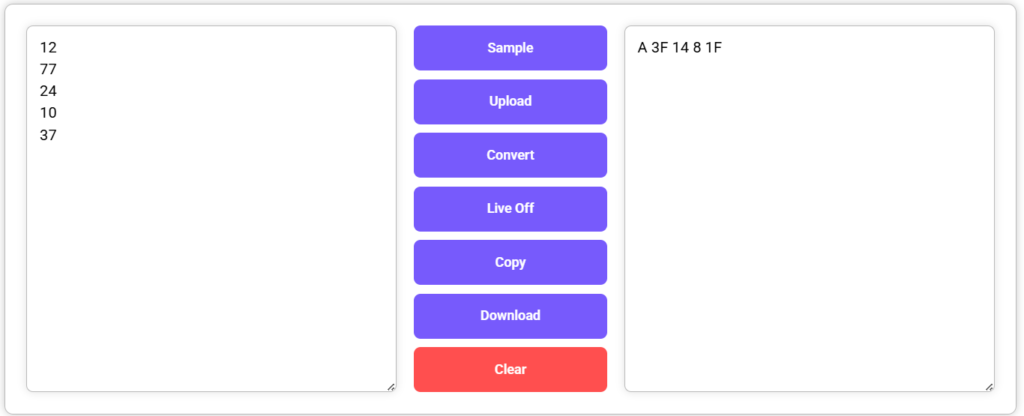The Octal to Hex Converter serves as a quick method to transform octal values to their hexadecimal equivalents. Octal and hexadecimal are commonly used in computing and electronics. The conversion can save time and is devoid of manual errors. Enter any octal value, and the converter into hex is instantaneous. This tool works easily to complete difficult conversions and guarantees correct results each time.
An octal converter to the hex uses numbers from an octal number system (base-8) to translate them into a hexadecimal number system (base-16). Both these number systems served almost the same functionality in computing and specifically in low-level programming and digital electronics. The tool helps to simplify the conversion process by automating the calculation process and ensuring the conversion is error-free and fast.
Step 1: Open the Octal to Hex Converter tool.
Step 2: Upload your file or manually enter the Octal number by typing or pasting it into the input field.
Step 3: You have two options to convert the Octal number: click the Convert button to do it manually, or turn on the Live On option for automatic conversion as you input data.
Step 4: Once the conversion is complete, you can either copy the Hexadecimal output or download it as a .txt file.
Fast and Correct Conversion: Provides instant conversion of octal value to hexadecimal values without manual intervention. This facility saves time and avoids human error.
User-Friendly Interface: Designed with special emphasis on simplicity to cater to students, hobbyists, and professionals with little technical intervention.
Error-Free Results: Eliminates the risk of calculation mistakes that can occur during manual conversion between number systems.
Educational Support: A great learning tool for students studying number systems, helping them understand the relationship between octal and hexadecimal formats.
Time-Saving Tool: Streamlines workflows for programmers, engineers, and technicians by providing fast results, especially when working on complex digital systems or coding tasks.
Cross-Platform Access: Can be used on any device with internet access, allowing for on-the-go conversions anytime, anywhere.
Easier to Understand Than Binary: Hexadecimal numbers are shorter and more readable than their binary counterparts, which therefore helps human minds in quickly deciphering and handling digital streams.
Helpful for Programmers: Programmers usually employ hexadecimal while debugging or reading error codes because this coding helps translate multitudes of binary data into more manageable formats.
Common in Web Design: Web color codes, which include shades such as green represented as #00FF00, have become an industrial standard in the area of design and development.
Widely Used in Computing: Hex is commonly used to represent memory addresses, machine codes, and other low-level data in computer systems. Thus, hex input is nothing but core computing.
Efficient for Data Storage: Since each hex digit represents a combination of four binary digits, it reduces data length and is beneficial for displaying and storing information in a clear and effective manner.

